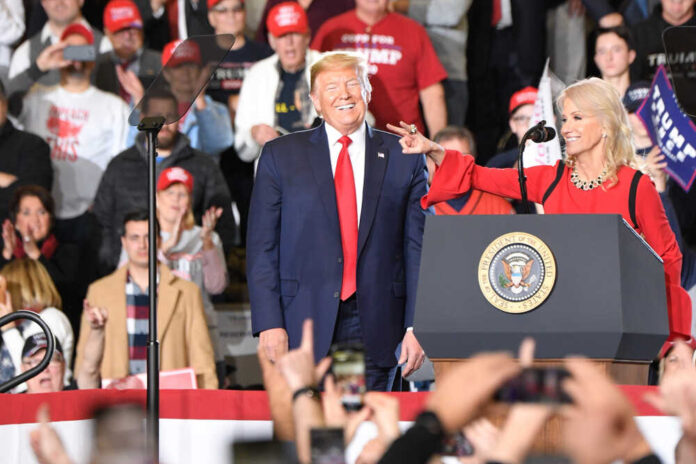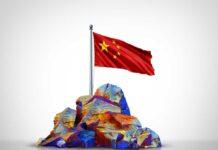
Democrats are stuck between an economic boom and China’s stranglehold as Kellyanne Conway exposes their tariff dilemma.
At a Glance
- Kellyanne Conway claims Trump’s tariff policies on Chinese goods have risen to 125%, creating major strategic problems for Democrats
- Conway highlights a surge in U.S. investments and job announcements directly linked to Trump’s aggressive trade stance
- Democrats face a challenging decision: support America’s economic interests or side with China
- Former Trump advisor suggests the administration’s approach demonstrates the strength and fairness American voters desire
Democrats’ China Dilemma Exposed
While the left continues its endless handwringing about Trump’s tariff policies, Kellyanne Conway has cut straight to the heart of what Democrats don’t want to admit – they have no plan to counter China’s economic warfare against America. In a recent Fox Business interview, Conway laid bare the uncomfortable truth that Democrats are scrambling to find a coherent response to Trump’s aggressive trade stance, which has already sparked a wave of new American investments and job announcements. The stark reality is that Democrats must now choose between standing with American workers or continuing their bizarre love affair with the Chinese Communist Party’s economic interests.
Kellyanne Conway says Democrats have big dilemma after more Trump trade and tariff success stories emerge https://t.co/mM3eiTXr52
— Bo Snerdley (@BoSnerdley) April 12, 2025
“So many corporations are hightailing it to 1600 [Pennsylvania Avenue] and saying ‘Hey, Mr. President, we’re opening up a new facility in North Carolina. We’re going to invest $20 billion in Americans and hire 5,000 new Americans in rural America over the next four or five years. And the White House is highlighting these success stories”
The American Strength Strategy
Under Trump’s leadership, tariffs on Chinese goods have skyrocketed to 125% – a move that has Beijing’s leadership sweating bullets while Democrats fumble for a response that doesn’t sound like they’re choosing foreign interests over American prosperity. What’s particularly telling is that Trump suspended tariffs for most other nations, demonstrating this isn’t some blanket protectionist policy but a targeted approach against China’s predatory trade practices. Conway’s assessment reflects what most Americans with common sense already know – the Chinese government only responds to strength, not the kowtowing approach that defined previous administrations’ disastrous trade policies.
Conway isn’t just speculating here. A recent poll shows unanimous support for Trump’s position that these tariffs strengthen America’s economic standing. While the mainstream media continues to obsess over hypothetical downsides, actual American businesses are voting with their dollars – announcing major domestic investments and hiring initiatives in direct response to Trump’s America-first approach. For Democrats who claim to champion American workers, their deafening silence on this economic revival is both telling and politically damaging.
Obama’s Credibility Crisis
Conway didn’t miss the opportunity to highlight former President Obama’s hypocrisy on trade issues, pointing out how his current criticisms of Trump’s policies directly contradict positions he took during his own presidency. This flip-flopping shouldn’t surprise anyone who’s been paying attention to Obama’s political maneuvering over the years. What should raise eyebrows is the media’s willingness to ignore these contradictions while amplifying every syllable of criticism against Trump’s approach. The intellectual dishonesty is staggering but predictable from a press corps that’s abandoned journalism for activism.
“In the first 100 days of Donald Trump’s first term, former President Barack Obama, who failed to get Hillary Clinton his third term, felt the need to go and tell the Wall Street Journal in an interview what President Trump, what Americans should be doing. Isn’t that rich? He won’t even say it now, won’t agree with it”
Strength Over Weakness
As Conway aptly summarized, “It’s called respect and fear. And I think this last election shows that Americans want strength over weakness, and they want fairness over unfairness.” This perfectly encapsulates why Trump’s approach resonates with voters tired of watching their country’s economic interests sacrificed on the altar of globalism. The fundamental choice facing Americans is clear – continue down the path of economic surrender championed by the current administration or return to the strength-based approach that delivered real results. While Democrats scramble to convince Americans that weakness is somehow preferable to strength, the economic data and corporate response to Trump’s policies tell a different story entirely.

























